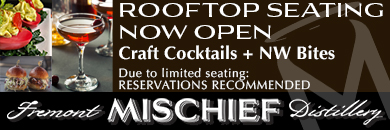originally posted 23 September 2011
This column on ‘The Painting Experience’ is being re-run in advance of a new opportunity to enjoy this journey into creative expression, on-line, April 11th & 12th, 2020.
Visit the website for more information on the upcoming workshop.

At ‘The Painting Experience’ workshop, held from September 30th to October 2nd at the Doric Lodge #92 (619 N 36th,) attendees will spend time painting, with no concern for artistic talent or ability. “Ultimately, it’s not about painting,” explained Stewart Cubley, “it’s about the creative process, and how the creative process carries over,” into our lives.
“There is no way you will not learn something about yourself,” stated Cubley, founder and director of ‘The Painting Experience.’ He and Annie Rousseau will facilitate the Fremont workshop, and create a supportive, comfortable environment to allow attendees to challenge their fears and explore their capacity for art. “A great majority are not artists,” Cubley explained about registrants, “it’s a very wide range of participants.”
‘I Can’t Draw A Stick Figure’
Some attend for a weekend of self-discovery, others as a spiritual journey (“some people see painting as a type of meditation,” Cubley observed.) There will be therapists who benefit personally while earning professional credits, and a few artists – not necessarily painters – for whom art has, “stopped being creative and fun, and become work.” Cubley observed the participants to be, “generally, people who sense they have the potential to be creative, and want to open that door and explore.”

As for those of us, including myself, who swear they can’t paint, or draw, (the subheader quotes – in bold – are mine,) Cubley chuckled, “people will tell me, with great passion, what they can’t do, and what they won’t do. Can you imagine tuning into that passion?”
‘The Painting Experience’ process explores that passion, and that resistance. “We don’t analyze the paintings,” Cubley explained. Before starting, participants are asked to leave criticism and comments at the door, to create a safe environment for everyone. Yet, he also observed that a ‘no comments’ policy frees everyone from the energy expended in thinking up ‘the right thing’ to say about the works of others.

“We don’t need to define things as much as we are prone to do,” Cubley stated, “as soon as you try to analyze and interpret,” you get bound up in definitions and verbiage, and move further away from the process. “The real healing happens in the process itself,” he said.
“Painting is so effective,” as a form of artistic expression and exploration, Cubley suggested, because of its non-verbal properties, its use of images and colors, and its immediacy as well as its permanence. Also, painting continuously requires a response to what you’ve done – while doing it. “Not-knowing has power,” Cubley has written, “To not-know means to accept your own voice, your own images, your own colors.”
‘I’m Not A Real Artist’
‘The Painting Experience’ challenges the idea that ‘an artist’ is someone else, and the stereotype of the artist as talented and tortured – possessing something that we mere mortals can’t grasp. These assumptions can actually stop creativity. “The process is about making art available to everyone,” Cubley observed, “it’s a shame that it’s been put off limits.”

“Once you remove so many of the stereotypes around art,” Cubley explained – including the need to please the teacher, competition, the belief that an ‘artist’ is someone else, etc. – “people start tuning into their own image maker, their own imagination, and dare to bring it on to the paper.”
‘Why Three Days?’
While participants ‘bring it on to the paper,’ they aren’t required to bring anything to the workshop – all painting supplies will be provided. Participants must pre-registration – and pay an entry fee of $425 (scholarships available) – but their biggest sacrifice may be the time they give themselves to explore.
Cubley actually offers these workshops over five or even 10 days. “The time is important,” he admitted, “There needs to be enough time to break through and meet the demons. To go beyond the novelty,” and the superficial, “and come out the other end.”
For more information on this year’s workshop – spaces remain available – or other, upcoming workshops check the website, and get on the mailing list. To learn more about Cubley, and the philosophy of ‘The Painting Experience,’ order a copy of his book, Life, Paint & Passion: Reclaiming The Magic Of Spontaneous Expression. We may not all be ‘artists’, but we all deserve access to our own spontaneous expression.
Related Articles
- Beading For The Crafts-Challenged
- by Kirby Lindsay, August 11, 2010
- Dave McKay, ‘Spiritual Father’ of the Fremont Arts Council
- by Kirby Lindsay, June 13, 2011
- Classes Bring Fremonsters To ‘The Artist’s Way’
- by Kirby Lindsay, May 9, 2012
- West Of Lenin Brings ‘The Omnicentric Universe’ To The Center Of The Universe
-
- by Kirby Lindsay, August 24, 2011
©2011 Kirby Lindsay. This column is protected by intellectual property laws, including U.S. copyright laws. Reproduction, adaptation or distribution without permission is prohibited.

